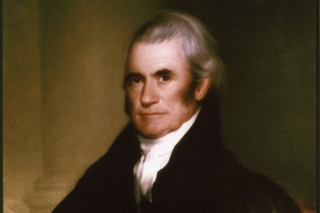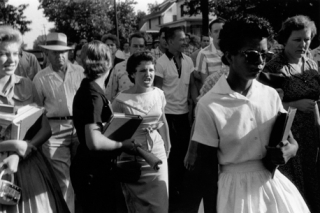About the Film
An Independent Judiciary examines both the impact Chief Justice John Marshall had on defining the role of the judiciary in the republic’s crucial early years, as well as two episodes in the struggle to ensure that judicial independence be accepted by the other branches of the government and the people themselves as a fundamental principal of American life.
View Trailer
We speak with Associate Justice Stephen Breyer as well as some of the foremost Constitutional scholars and John Marshall experts to understand the role the Chief Justice played in shaping the Supreme Court, the judiciary and the nation. Professor James Simon, the author of the Marshall biography What Kind of Nation and Dean Emeritus at New York Law School, provides insight and context to help understand Chief Justice Marshall’s impact on the early republic. Meanwhile, Professors Laurence Tribe and Charles Ogletree of Harvard Law School guide us through Marshall’s most important case, Marbury v. Madison, and the principle of judicial review it helped establish.
We also review two historical episodes, over 120 years apart, that have proven just how important judicial independence is to a free and democratic country.
The first episode is the Cherokee Nation’s attempt in the 1830s to retain its territory in Georgia. The tribe chose not to fight on the battlefield but in the courts, which gave it a fair hearing. But the Supreme Court’s final ruling in favor of the Indian tribe, written by Chief Justice John Marshall as he was nearing the end of his illustrious time on the Court, was defied by President Jackson and Georgia state officials. The result was not only a weakening of the judiciary’s standing in the federal government and in the eyes of the people, but also a national tragedy and one of the darkest chapters of American history, the Trail of Tears. Associate Justice Stephen Breyer discusses the impact this case had on the Court, and Cherokee storyteller Gayle Ross, a descendent of the Cherokee Nation’s Principal Chief during these tumultuous times, the esteemed John Ross, explains how the nation’s defiance ultimately led to the death of thousands of Cherokee Indians.
By the time of our second episode, in 1957, the Constitution and the nation had been changed by Civil War and a century’s experience. This time, the Executive fulfilled his charge to carry out the law by integrating the public schools of Little Rock, Arkansas despite public protests and the open defiance of Arkansas Governor Orval Faubus. Captured on film, President Dwight Eisenhower turns a terrible moment in the nation’s fight for equal rights into a Constitutional triumph, and the Supreme Court affirms that justice depends on judicial independence.
At the center of the fight to integrate Little Rock Central High School was the Little Rock 9, a group of teenagers who bravely faced outright public hostility to their desire to attend one of the most prestigious high schools in Arkansas.
Roy Reed, Arkansas historian and journalist and author of the biography Faubus, helps us understand what motivated Governor Faubus and the people of Arkansas to attempt to openly defy the Supreme Court. And Ernest Green, one of the Little Rock 9 and the first African-American to graduate from Central High, talks about how the actions of the President and the Supreme Court affirming the judiciary’s independence personally changed his life.
An Independent Judiciary is part of a series of films produced for Annenberg Classroom, a project of the Annenberg Foundation Trust at Sunnylands in partnership with the Annenberg Public Policy Center of the University of Pennsylvania. AnnenbergClassroom.org is an online gateway to award-winning resources for students and teachers.
Image Gallery
[Not a valid template]Further Reading
Learn more about Chief Justice John Marshall
Learn about the Cherokee Nation
Read about the Cherokee Nation’s first principle chief, John Ross
See who the Little Rock Nine students were
Credits
Producer, Writer and Narrator, Robe Imbriano
Associater Producer, María E. Matasar-Padilla
Editor, Marc Tidalgo
Graphics Animators, Jimmy Higgins and Stevie Clifton
Camera, Edward Marritz and Daryl Pendana
Production Associates, Caitlin Costin and Thomas Beckner
Coordinating Producer, Gabrielle Tenenbaum
Sound, Mark Mandler
Music, Ben Decter and Gavin Allen
Senior Producer, Kayce Freed Jennings
Executive Producer, Tom Yellin



